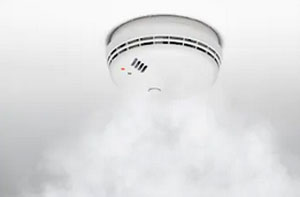Fire Alarms
Fire Alarm Installation
Providing an audible signal in the event of a fire, fire alarms allow for rapid evacuation, minimizing the risk of injury and property damage. The focus of this article is to delve into the various fire alarm systems, their attributes and advantages, and the significance of consistent inspection and upkeep.
Firstly, it is important to understand the different types of fire alarms available. One of the most common types of fire alarm is the smoke detector, which senses the presence of smoke particles in the air and triggers an alarm. These detectors are typically installed on the ceiling or wall and can be either battery-operated or hardwired into the building's electrical system.
Another type of fire alarm is the heat detector, which senses increases in temperature and triggers an alarm when a specific threshold is reached. Heat detectors are typically used in areas where smoke detectors may not be suitable, such as in kitchens or areas with high levels of dust or moisture.
Multi-sensor detectors are also available, which combine smoke and heat detection into one unit, providing a more comprehensive level of protection. These detectors use sophisticated algorithms to differentiate between smoke and other airborne particles, reducing the likelihood of false alarms.
In addition to these types of detectors, there are also different types of fire alarm systems available, each designed for specific applications. One such system is the conventional fire alarm system, which is typically used in smaller buildings or those with less complex layouts. This system uses a series of detectors that are wired to a central control panel, which then triggers an alarm when smoke or heat is detected.
Addressable fire alarm systems are another type of system, which are typically used in larger buildings or those with more complex layouts. These systems use a network of detectors that are connected to a central control panel, allowing the location of the alarm to be pinpointed more precisely.

Wireless fire alarm systems are also available, which use radio frequency signals to communicate between the detectors and the control panel. These systems are typically faster and easier to install than traditional wired systems, as they do not require the installation of cabling.
Regardless of the type of fire alarm system used, it is important to ensure that they are regularly tested and maintained. This involves regular inspection and cleaning of detectors, as well as the replacement of batteries and other components as required.
It is also important to ensure that fire alarm systems are installed correctly, by a qualified professional with experience in fire safety systems. This will ensure that the system is tailored to the specific needs of the building and provides the highest level of protection possible.
In addition to the installation and maintenance of fire alarm systems, it is also important to ensure that all occupants of the building are aware of the procedures to follow in the event of a fire. This includes regular fire drills and training on how to use fire extinguishers and other fire safety equipment.
Overall, fire alarms play a crucial role in protecting occupants and buildings from the devastating effects of fire. By ensuring that fire alarm systems are installed correctly, regularly tested and maintained, and that all occupants are aware of fire safety procedures, we can help to reduce the risk of fire and protect the safety of those around us.
Some of our fire alarm pages:
http://www.firealarmz.uk/wednesfield.html
http://www.firealarmz.uk/croxley-green.html
http://www.firealarmz.uk/kidderminster.html
http://www.firealarmz.uk/stansted-mountfitchet.html
http://www.firealarmz.uk/earl-shilton.html
http://www.firealarmz.uk/warsash.html
http://www.firealarmz.uk/bonnybridge.html
http://www.firealarmz.uk/leamington-spa.html
http://www.firealarmz.uk/fenton.html
http://www.firealarmz.uk/carterton.html
http://www.firealarmz.uk/midhurst.html
http://www.firealarmz.uk/bishops-waltham.html
http://www.firealarmz.uk/lerwick.html
http://www.firealarmz.uk/inverkeithing.html
http://www.firealarmz.uk/ilfracombe.html
http://www.firealarmz.uk/emsworth.html
http://www.firealarmz.uk/manningtree.html
http://www.firealarmz.uk/burslem.html
http://www.firealarmz.uk/whitehaven.html
http://www.firealarmz.uk/brimington.html
http://www.firealarmz.uk/bonnyrigg.html
http://www.firealarmz.uk/inverurie.html
http://www.firealarmz.uk/balderton.html
http://www.firealarmz.uk/cowdenbeath.html
http://www.firealarmz.uk/oldham.html
http://www.firealarmz.uk/bishopbriggs.html
http://www.firealarmz.uk/princes-risborough.html
http://www.firealarmz.uk/morecambe.html
http://www.firealarmz.uk/st-agnes.html
http://www.firealarmz.uk/darley-dale.html
http://www.firealarmz.uk/leyland.html
http://www.firealarmz.uk/lanark.html
http://www.firealarmz.uk/ely.html
http://www.firealarmz.uk/gillingham.html
http://www.firealarmz.uk/swanscombe.html
http://www.firealarmz.uk/rainworth.html
http://www.firealarmz.uk/stepps.html
http://www.firealarmz.uk/heckmondwike.html
http://www.firealarmz.uk/wilmington.html
http://www.firealarmz.uk/bearsted.html
More: Fire and Safety Systems, Fire Alarm Systems, Residential Fire Alarms, Fire Alarm Companies, Fire Alarm Services, Fire Alarm Installers, Residential Fire Alarms, Fire and Safety Systems, Fire Alarm Services, Fire Alarm Installers, Cheap Fire Alarms, Commercial Fire Alarms, Fire and Safety Systems, Fire and Safety Systems, Commercial Fire Alarms, Fire Alarm Services, Fire Alarm Installation, Fire Alarm Companies, Smoke Alarm Installation, Smoke Alarms, Fire Alarm Installers, Smoke Alarm Installation, Cheap Fire Alarms, Fire Alarm Maintenance, Fire Alarm Services, Commercial Fire Alarms, Fire Alarms, Domestic Fire Alarms, Fire Alarm Installers, Fire Alarm Maintenance, Fire Alarm Installation, Residential Fire Alarms, Residential Fire Alarms, Smoke Alarm Installation, Commercial Fire Alarms, Fire Alarm Installation, Domestic Fire Alarms, Fire Alarm Systems, Fire Alarm Services, Smoke Alarm Installation, Residential Fire Alarms, Smoke Alarms, Fire Alarm Testing, Fire Alarm Testing, Fire Alarm Systems, Fire Alarm Installers, Fire Alarm Services, Fire Alarm Services, Fire Alarm Maintenance, Fire Alarm Maintenance.


